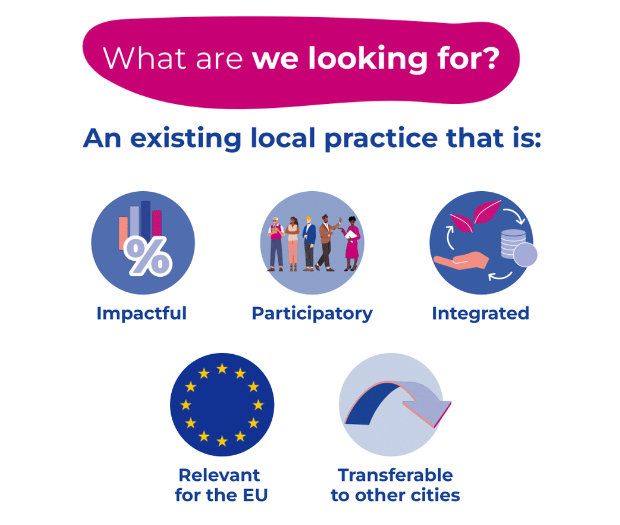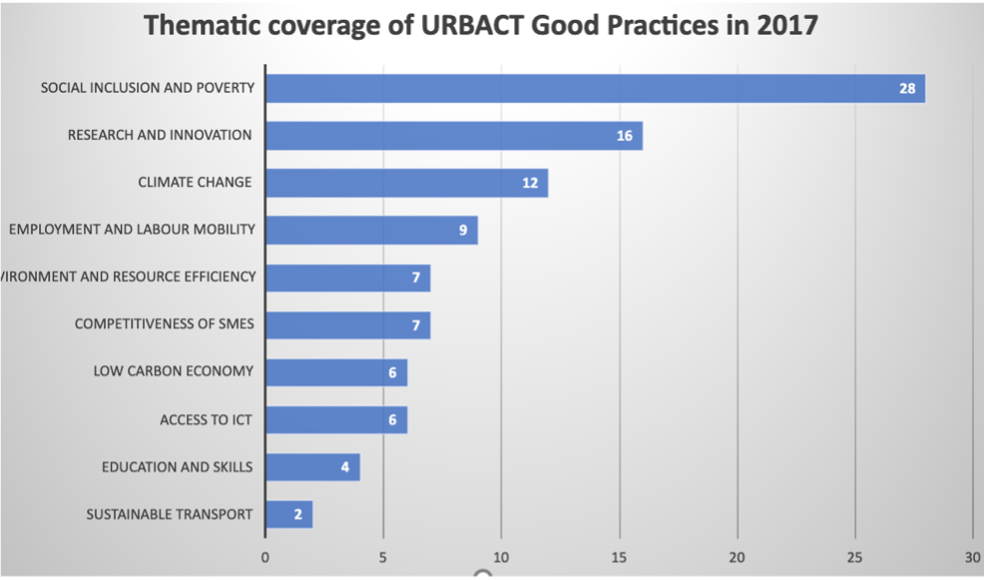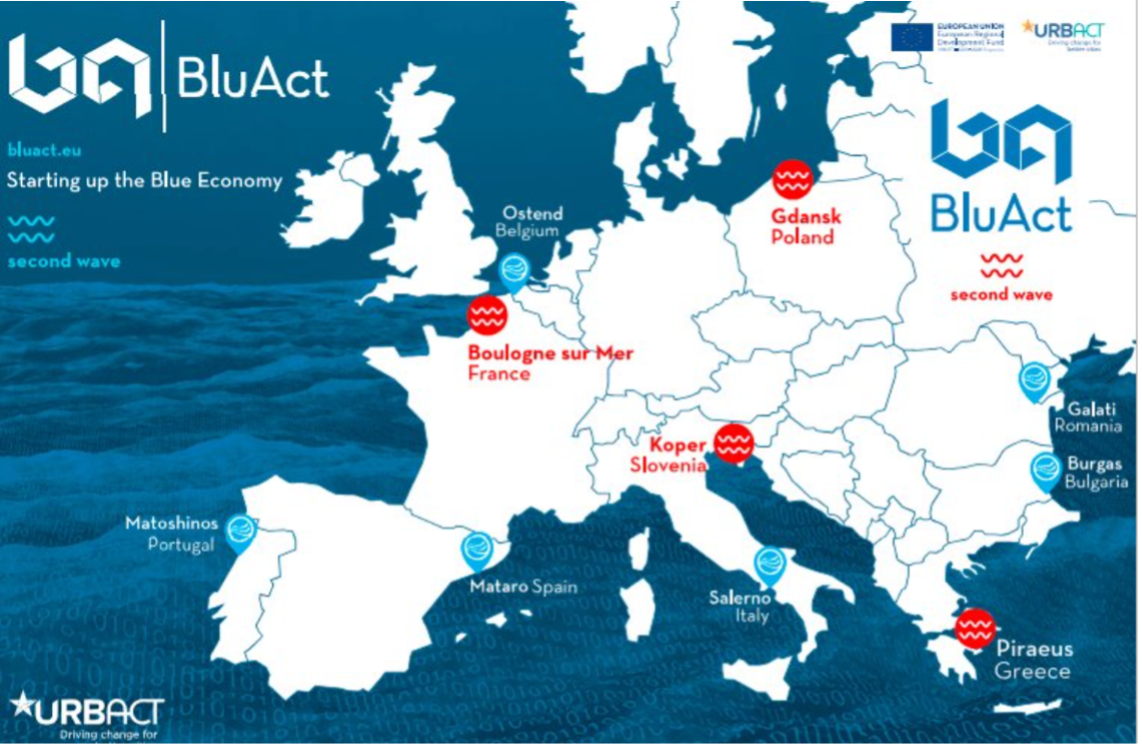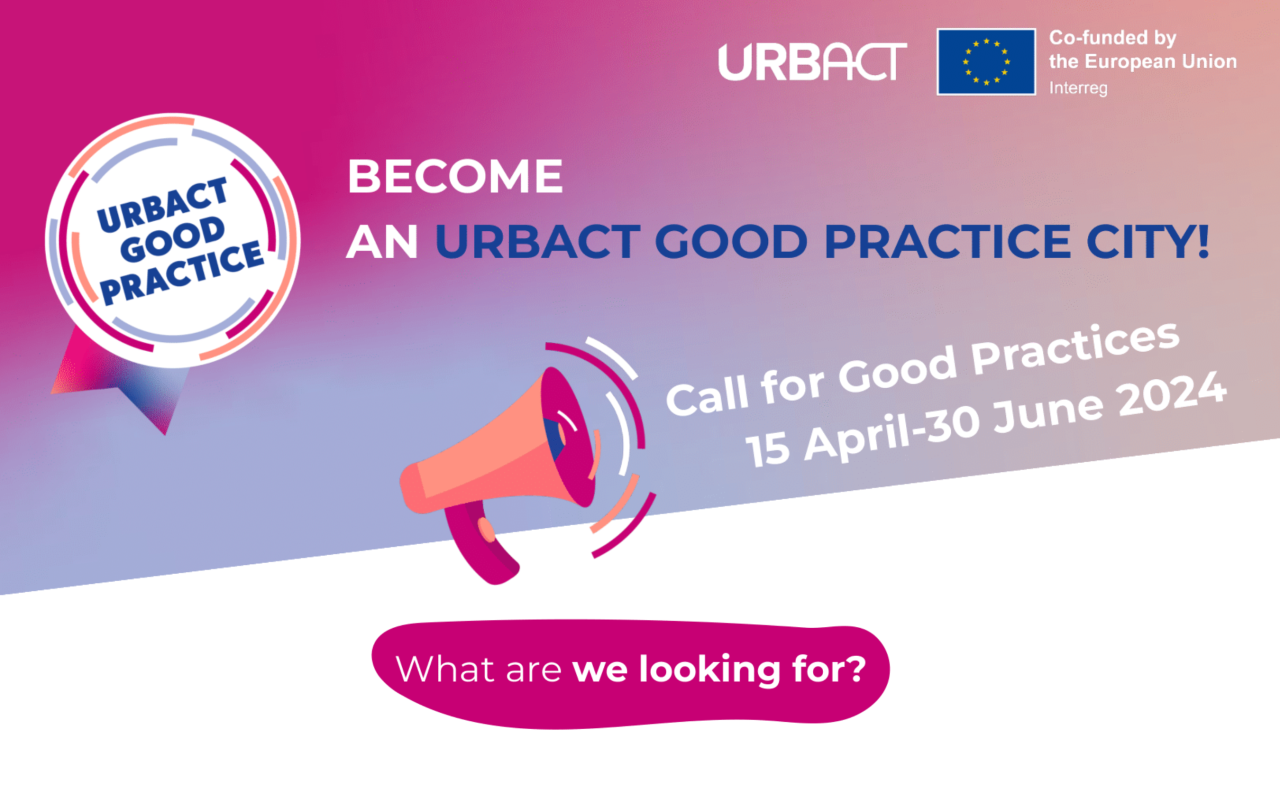On 15 April, URBACT launched a call for Good Practices (running until 30 June 2024). The call aims to reward impactful local practices in sustainable urban development, which can be a source of inspiration and transfer to other European cities.
If you are working on sustainable urban development, you might be asking yourself: What, exactly, makes a practice ‘good’? This article looks at a handful of the 97 URBACT Good Practices awarded to cities from 25 EU countries in 2017. While these practices cover environmental, social, governance or economic themes, what got them their URBACT label?

Four fundamental dimensions enable a local good practice to be awarded as an URBACT Good Practice. These represent the principles and values underpinning URBACT since 2002:
- Relevance at European level
- A participatory and integrated approach
- Positive local impact
- Transferability
Relevance at European Level
As a European Territorial Cooperation programme, URBACT has to respond to the needs and priorities of European cities on urban development in accordance with the EU Cohesion Policy and its objectives. An URBACT Good Practice, therefore, serves or contributes to this framework, or the Sustainable Development Goals, or topics of the partnerships of the Urban Agenda for the EU. This is evident in the topics covered by the 97 URBACT Good Practices awarded in 2017:

The examples featured in this article touch on these different themes. They also exemplify other characteristics that are considered when selecting an URBACT Good Practice.
A participatory and integrated approach
Cities face a spectrum of environmental, economic and social challenges, which are becoming more interconnected. Even if a challenge might fall under one theme (for example, motorised mobility), an integrated approach considers other important dimensions, like gender equality, digital, green transition, related to mobility and the different groups of the local population. The participatory element of a Good Practice refers to the involvement of different local actors, not only from different departments of the city administration, but with the civil society itself.
Riga (LV) has found a way to use social urban spaces (i.e. community centres) to boost social integration and awareness of local affairs. Established in 2013, the Riga NGO House was created in response to requests from the inhabitants of Riga, themselves. As a community-inspired initiative, the NGO House serves the educational, technical and information support needs of the immediate community. It has gone on to host thousands of visits and events, organised by different NGOs and sometimes coordinated with other municipalities (e.g. twinning and networking events).
This practice has been officially recognised by URBACT for empowering the non-governmental sector. The lessons learnt and exchange visits are documented in the final outcome of the Active NGOs Transfer Network, ‘The Power of Civic Ecosystems’.
Located in a designated ‘buffer zone’, the small town of Athienou (CY) faces a unique set of historical, geographical, intergenerational, urban-rural challenges. The town’s Municipal Council of Volunteers (MCV) has been recognised by URBACT for its intergenerational approach to volunteerism. Volunteers work to address local social challenges and provide support services to residents, particularly from vulnerable communities. The volunteering activities take place at the Kleanthios Elderly Home, the Konstanileneion Center for Adults, the Municipal Nursery Center and the Social Welfare Committee. The MCV’s membership is seeing an increase, particularly of younger volunteers, a general awareness and commitment to rebuilding social ties.
Athienou’s breakthrough active civic participation solution has been adapted by other European cities through the Volunteering Cities Transfer Network.
In 2014 Turin (IT) launched a competition for all municipal employees (counting around 10.000) to push innovative projects and ideas for the city, developing and improving new services, environment-friendly projects, using information and communication technologies. This served as a model for creating a culture for innovation within the city administration (e.g. improving performance, reducing waste, maximising resources). In 2017, 71 projects have been submitted, 111 employees involved, and 10 proposals rewarded.
The practice was designated as an URBACT Good Practice because it helps to increase data and digital tools management to address urban challenges. The application can be seen in the partner cities of Innovato-R Transfer Network.
Positive impact at local level
All URBACT Good Practices need to have a concrete solution to a host of thematic urban challenges. These, inevitably, have to respond to local needs. For a practice to be an URBACT Good Practice, ‘positive impact’ really means the positive change in a community. In other words, there should be a clear ‘before’ and ‘after’ effect, and a specific explanation of how and why it was effective.
Mouans-Sartoux (FR) has been serving 100% organic daily meals in its schools since 2012. The city’s collective school catering scheme is officially recognised as an URBACT Good Practice, not simply because of its holistic approach, which brings together municipal farmers, schools, NGOs and local organisations. The decision to procure organic meals in school canteens has welcomed a behavioural shift in the local population. More residents are becoming aware and adopting healthier and sustainable food diets. In fact, in the last five years, Mouans-Sartoux has reduced its carbon impact by more than 20%!
Mouans-Sartoux’s practice offers critical insights into how other cities can bring about shifts in food systems for the betterment of the local community. The practice has since been adapted by other European cities through two URBACT Transfer Networks, BioCanteens and BioCanteens #2 Transfer Network.
Chemnitz (DE) has developed a real estate management solution to deal with the problem of decaying historic buildings in the city centre. The city’s real estate authority, Agentur StadtWohnen Chemnitz, conducted a survey on vacant/derelict buildings and apartments, identified potential buyers and investors and activated support from public and private stakeholders. The results were compelling, which is why URBACT recognises the practice for its positive local impact: Chemnitz has seen an increasing interest from local investors in rehabilitating historic housing and repurposing abandoned buildings (with housing cohabitations, shelters, social institutions).
The Chemnitz practice also holds promise for how cities can combat negative trends and urban processes that are not sustainable (e.g. suburban sprawl, car use, expensive housing, etc.).
Learn more about this practice and how it was transferred through the ALT/BAU Transfer Network.
Santiago De Compostela (ES) developed a game-based web platform to encourage recycling and other environmentally responsible behaviour. Green points (waste disposal points) were set up in the city centre. In exchange for disposing of waste at these points, citizens have the chance to win recycling vouchers, which can be used at local shops or exchanged at the City Council. In the first 2 years, tens-of-thousands of recycling actions have been registered at civic centres and green points and more than 115 local sponsors had delivered 800 rewards via the Tropa Verde platform.
The gamification of urban waste reduction developed by Santiago De Compastela shows how to involve local communities in the green transition. The practice has been adapted by partner cities (including Zugló (HU) involved in the Tropa Verde Transfer Network.
Transferability
From the 2018 to 2022, 23 of the above-mentioned 97 URBACT Good Practices have been transferred and adapted in other 188 European cities, thanks to URBACT Transfer Networks. These 23 URBACT Good Practice Cities have also benefitted from the exchanges with the other cities, and with URBACT experts, to further improve their practice. URBACT Good Practice Cities set an example through and beyond the URBACT Networks. This potential for transferability is a key award criterion: the practice should be applicable to different contexts and regions.
For instance, Ljubljana (SI) set up ‘the Bee Path’ programme in 2015 to raise awareness of the city’s bee-keeping heritage: its over 300 beekeepers, 4.500 beehives housing, more than180 million bees. The path is designed in such a way that visitors realise the importance of bees for our survival, in addition to discovering the city's beekeeping and honey-making culture.
This practice is centred around raising awareness of and preserving urban biodiversity and contributing to a more sustainable and sufficient community in Ljubljana. However, its legacy lives on through the BeePathNet Transfer Network and a European-wide network of bee-friendly cities (‘Bee Path Cities’).
Learn more about Bee Path Cities and check examples of how the practice has been transferred in Bydgoszcz (PL) and the other European cities.
In 2014, Piraeus (EL) established Blue Growth Piraeus: an urban sustainable development initiative focused on the Blue Economy. Still rocking in the waves of the 2008 global financial crisis, this initiative set out to boost the local maritime economy. Still in practice, Blue Growth Piraeus aims to mentor and encourage start-ups to develop services and solutions for the maritime economy, adapted to the digital transition.
Piraeus was able to transfer its URBACT Good Practice as leader of the BluAct URBACT Transfer Network (2018-2021) and another pilot URBACT Transfer Network, BluAct second wave (2021-2022). What was observed in Piraeus can easily be replicated and adapted in other European cities that have coastal or maritime economies.
This transferability has been proven in Mataro (ES), which adapted the five stages of the Blue Growth Piraeus Competition and other partner cities through BluAct Transfer Networks.

Preston (UK) developed a procurement spending practice that simultaneously jumpstarts the local economy, helps businesses reduce their carbon footprint and combats social exclusion. It is also based on a participatory approach, whereby public (universities, hospitals) in the city and social-sector institutions work together to ensure that their procurement spending is used to bring additional economic, social and environmental benefits to local economies.
It came up with a toolkit and video series, which were useful tools for transmitting the knowledge and insights acquired by the city through the practice.
The practice has been effectively transferred to Koszalin (PL) and other European cities involved in the Making Spend Matter Transfer Network.
Find out more: URBACT Call for Good Practices open until 30 June 2024
Evidently, URBACT Good Practices come in all shapes and sizes; the value of a practice extends beyond a specific city or example. Nevertheless, they point to a common throughline for successful and enduring approaches to developing and transferring a practice. First, urban municipalities need to work within the EU and regional policy contexts and objectives to implement good practices. Second, a participatory and integrated approach to sustainable urban development is needed to solve the multi-faceted challenges facing today’s cities. Third, local communities need to be inspired and engaged at all levels of sustainable urban policy making. Fourth, the transferability of a practice, to different cities and contexts, means a wider impact in Europe thanks to URBACT Transfer Networks. Ultimately, by leading Transfer Networks, URBACT Good Practice Cities can improve the implementation of their practices, following the insights of their partner cities and URBACT experts.
Interested in applying? All you need to know about the URBACT call for Good Practices (open until 30 June 2024) can be found on urbact.eu/get-involved.


